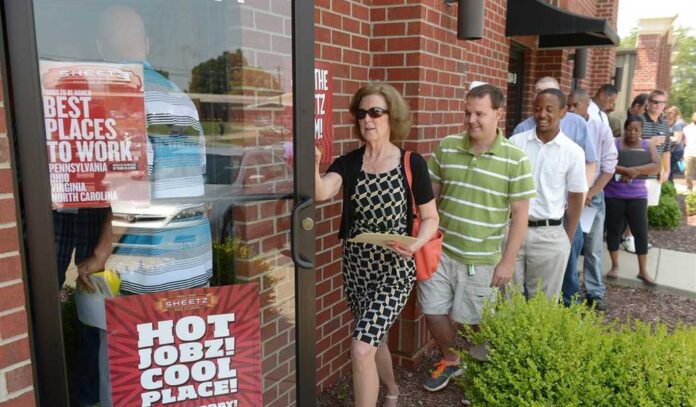On Wednesday, President Joe Biden made a campaign stop at a Pittsburgh convenience store, the same day that the Biden administration announced a lawsuit against the Pennsyvania-based chain. Sheetz is a privately held family-run company with over 23,000 employees. During his visit, Biden purchased snacks and took photos with customers and employees
According to the suit brought by the United States Equal Employment Opportunity Commission, Sheetz Inc., a convenience store and gas chain that operates more than 700 stores in six states, denied employment to a class of job application due to their race.
U.S EEOC accuses Sheetz of engaging in a discriminatory practice where they screen all job applicants for criminal convictions and subsequently deny them employment based on these records. According to the EEOC’s charge, this screening process has resulted in a disproportionate number of black, Native American, and multiracial applicants being screened out and denied employment opportunities at Sheetz.
The applicant screening is alleged to violate Title VII of the Civil Rights Act of 1964, while the lawsuit does not contend that this was an intentionally racially motivated outcome of the screening process.
According to the Associated Press, 14.5 percent of Black applicants were allegedly denied employment due to a failed background check, multiracial applicants were turned away 13.5 percent of the time, and Native Americans were denied employment opportunities at a 13 percent rate. Meanwhile, less than 8 percent of white job applicants were denied employment on the same basis.
In a statement issued on Thursday, EEOC Regional Attorney Debra M. Lawrence said:
Federal law mandates that employment practices causing a disparate impact because of race or other protected classifications must be shown by the employer to be necessary to ensure the safe and efficient performance of the particular jobs at issue. Even when such necessity is proven, the practice remains unlawful if there is an alternative practice available that is comparably effective in achieving the employer’s goals but causes less discriminatory effect.
EEOC Philadelphia District Office Director Jamie R. Williamson said:
This highlights the significance of the observance of April as Second Chance Month, underscoring our nation’s commitment to reintegrating individuals with criminal records into society by ensuring they have fair access to employment and other essential services. To that end, the EEOC is dedicated to making sure that individuals with criminal records are not unlawfully excluded from employment opportunities because of race.
Nick Ruffner, Sheetz’s public relations manager, also issued a statement, saying:
Sheetz does not tolerate discrimination of any kind. Diversity and inclusion are essential parts of who we are. We take these allegations seriously. We have attempted to work with the EEOC for nearly eight years to find common ground and resolve this dispute. We will address the claims in Court when the time comes.
Two applicants brought complaints against Sheetz and the EEOC notified the company in 2022 of its allegedly unlawful hiring practices, which it says go back to 2015. The EEOC says its inability to mediate a settlement with Sheetez escalated into the lawsuit filed in federal court last week.
Read More:
Disney Slapped With Another Massive Civil Rights Lawsuit Over Racist Discrimination
Federal Judge Rules Biden Administration Can’t Force Christian Employers to Pay for Trans Surgeries




